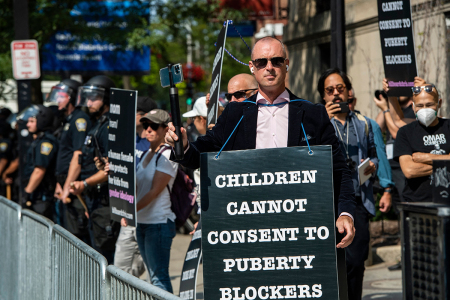Boston Children's slashed doctors' time to assess kids before referring them for trans procedures

A former “gender care specialist” at Boston Children’s Hospital testified that her ex-employer slashed the time allotted for psychologists to assess minors exhibiting confusion about their sex before referring them for irreversible medicalized gender procedures.
Dr. Amy Tishelman, 68, a clinical and research psychologist, started working for Boston Children’s gender clinic in 2013 before her termination in 2021. Tishelman was also selected by the World Professional Association for Transgender Health as the international lead to develop the "Child" chapter for its Standards of Care version 8.
As The New York Sun reported last week, the hospital terminated Tishelman in 2021 because she allegedly violated a patient privacy law; however, she filed a lawsuit accusing her former employer of ageism, sexism and retaliation.
Tishelman stated before the Suffolk County Superior Court in Boston last week that, at the beginning of her career working at the gender clinic, she initially had 20 hours or more to assess children who expressed feelings of disassociation from their actual sex. The time allotted also included the writing of a report on each child's assessment.
Over the years, however, the hospital reduced the consultation time, allowing Tishelman 10 hours to assess patients and write a report. Then, around six years ago, the hospital allotted only about two hours of assessment time and 30 minutes to write the report, according to the psychologist.
“I didn’t feel like that was doable at all,” Tishelman said, denouncing the practice as “reckless.”
Tishelman stressed during her testimony that minors using drugs to alter their puberty is not something to take lightly, as there are "a lot of things to think about in the long- and short-run.”
“It’s not like taking an aspirin. It’s a big deal," Tishelman testified.
Boston Children’s Hospital did not respond to The Christian Post’s request for comment.
The hospital, which is adjacent to Harvard Medical School, has boasted in the past about its Gender Multispecialty Service, stating on its website that it is “proud to be home to the first pediatric and adolescent transgender health program in the United States.”
The site states that GeMS has provided so-called “gender-affirming care” to more than 1,000 families.
Last year, the Executive Office of Health and Human Services of Massachusetts confirmed that the hospital received over $1.4 million in taxpayer money for "gender transition services" performed on minors at the Center for Gender Surgery.
Discussions about the potential harms of allowing gender-confused children to undergo life-altering procedures have received renewed attention following a report that a leading proponent of trans surgeries withheld the results of a taxpayer-funded study.
The study, which is part of a project that has received nearly $10 million in taxpayer funding from the National Institutes of Health, showed there were no positive mental health effects for gender dysphoric children who used puberty blockers.
Dr. Johanna Olson-Kennedy, the head of the largest gender clinic in the United States at the Children’s Hospital of Los Angeles, told The New York Times that she feared the study’s results would be “weaponized” by opponents of these procedures. Olson-Kennedy also admitted that she thought the study “could be used in court to argue that 'we shouldn’t use blockers.’”
As the outlet reported, Tishelman criticized the withholding of the study’s results, adding that “it’s really important to get the science out there.”
"No change isn't necessarily a negative finding — there could be a preventative aspect to it," she said. "We just don’t know without more investigation."
The study began in 2015, and it followed 95 children with an average age of 11 who started taking puberty-blocking drugs. Olson-Kennedy asserted that the reason the study showed no improvement in children’s mental health after two years is because they were already "in really good shape."
The New York Times noted that about a fourth of the patients in the study "were depressed or suicidal" before their treatment.
Samantha Kamman is a reporter for The Christian Post. She can be reached at: [email protected]. Follow her on Twitter: @Samantha_Kamman






















